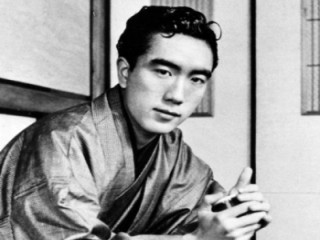
Yukio Mishima biography
Date of birth : 1925-01-14
Date of death : 1970-11-25
Birthplace : Shinjuku, Tokyo
Nationality : Japanese
Category : Famous Figures
Last modified : 2011-06-06
Credited as : Author, Nobel Prize in Literature,
1 votes so far
Yukio Mishima is one of the most widely-read Japanese authors of the 20th century, due in part to his dramatic suicide in 1970. Born in Tokyo, Mishima studied law and was a civil servant before turning to writing exclusively. Over his career he was incredibly prolific, a writer of novels, short stories, plays and political and literary criticism, beginning in the late 1940s. Nominated for the Nobel Prize three times, his most famous books include Gogo no eiko (1965, translated as The Sailor Who Fell From Grace With the Sea), Kinkakuji (1956, The Temple of the Golden Pavilion) and the tetralogy Hojo no umi (1965-71, The Sea of Fertility). His personal life got just as much attention as his writing: after a 1952 trip to Greece Mishima began a strict regimen of body-building, and he became keen on photographing his chiseled physique in poses reminiscent of the death of the Christian martyr St. Sebastian. He also became obsessed with loyalty to the emperor and formed his own small army, called the Shield Society. On November 25, 1970, he delivered the complete manuscript of the last work in his tetralogy, then proceeded with four followers to the headquarters of the Japanese Self-Defense Force, where he read a "manifesto" and then committed seppuku (ritual disembowelment), after which one of his compatriots chopped his head off. He is considered by many to be one of the greatest Japanese writers of the 20th century, but other critics have dismissed his work as examples of egocentric decadence.
Author of books:
Confessions of a Mask (1948)
Thirst for Love (1950)
Forbidden Colors (1953)
The Sound of Waves (1954)
The Temple of the Golden Pavilion (1956)
Kyoko's House (1959)
After the Banquet (1960)
The Black Lizard and Other Plays (1961)
The Sailor Who Fell from Grace with the Sea (1963)
Silk and Insight (1964)
Acts of Worship (1965)
Madame de Sade (1965)
Patriotism (1966)
Death in Midsummer and other stories (1966)
Way of the Samurai (1967)
My Friend Hitler and Other Plays (1968)
Sun and Steel (1970)
The Sea of Fertility tetralogy:
1. Spring Snow 1968
2. Runaway Horses 1969
3. The Temple of Dawn 1970
4. The Decay of the Angel 1970
















